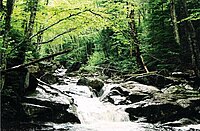Ecosystem ecology

Okay, kiddo. Let me explain to you what ecosystem ecology means.
Do you know what an ecosystem is? It's like a big community of animals, plants, and other things that live together in a certain area. Think of it as a big house with different rooms and lots of different friends, each with their own job to do.
Now, the study of ecosystem ecology is all about looking at how everyone in that house works together. Just like how you and your family do different jobs to keep your home clean and happy, the animals and plants in an ecosystem have their own jobs too.
Some animals eat plants, and some animals eat other animals. Some plants get energy from the sun and make food for themselves, while others get food from the soil. And all of these things – the sun, the soil, the plants, and the animals – are connected like pieces of a puzzle.
But sometimes, things can get out of balance. If there are too many animals that eat plants, for example, the plants might not have enough energy to grow. Or if there isn't enough water in the soil, the plants might not be able to get enough nutrients, and they'll start to die off.
That's why scientists who study ecosystem ecology look at all of these different pieces and figure out how they fit together. Sometimes they even try to help fix things when they're not working quite right, by planting more trees or helping animals move to different areas where there's more food.
In the end, the goal is to make sure that every part of the ecosystem is healthy and happy, so that everything works together smoothly. And just like how your family helps keep your home clean and happy, everyone in an ecosystem has a role to play in keeping their home – their ecosystem – thriving.
Do you know what an ecosystem is? It's like a big community of animals, plants, and other things that live together in a certain area. Think of it as a big house with different rooms and lots of different friends, each with their own job to do.
Now, the study of ecosystem ecology is all about looking at how everyone in that house works together. Just like how you and your family do different jobs to keep your home clean and happy, the animals and plants in an ecosystem have their own jobs too.
Some animals eat plants, and some animals eat other animals. Some plants get energy from the sun and make food for themselves, while others get food from the soil. And all of these things – the sun, the soil, the plants, and the animals – are connected like pieces of a puzzle.
But sometimes, things can get out of balance. If there are too many animals that eat plants, for example, the plants might not have enough energy to grow. Or if there isn't enough water in the soil, the plants might not be able to get enough nutrients, and they'll start to die off.
That's why scientists who study ecosystem ecology look at all of these different pieces and figure out how they fit together. Sometimes they even try to help fix things when they're not working quite right, by planting more trees or helping animals move to different areas where there's more food.
In the end, the goal is to make sure that every part of the ecosystem is healthy and happy, so that everything works together smoothly. And just like how your family helps keep your home clean and happy, everyone in an ecosystem has a role to play in keeping their home – their ecosystem – thriving.
Related topics others have asked about:
